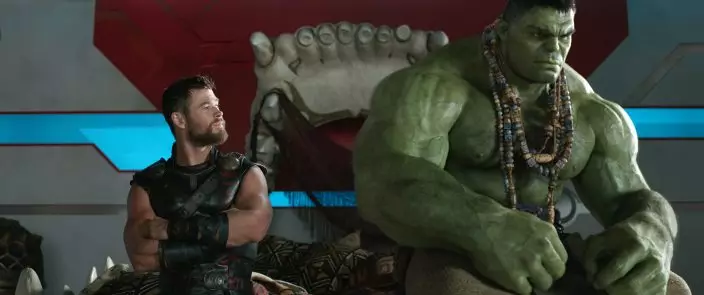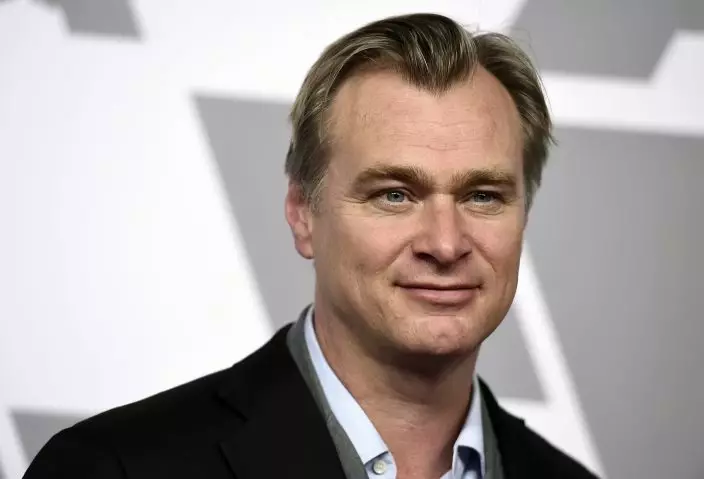It's not exactly the stuff of "Stop the presses!" that some of the greatest filmmakers in the world have misgivings about the rise of the superhero film and its outsized place in our film culture.
And yet recent critical comments by Martin Scorsese and Francis Ford Coppola have been greeted like entreaties to a prizefight, a battle royale. "In this corner, the box-office champion of the wooooorld, Marvel 'The Incredible Hulk' Studios! And in this corner, the 76-year-old maker of anguished Catholic epics and crime-movie classics, Martin 'The-Raging-Bull' Scorsese!"
Plenty of rumbling has followed since Scorsese, in a magazine interview earlier this month, suggested Marvel movies aren't cinema but "something else" — theme park rides uninterested in "trying to convey emotional, psychological experiences to another human being." Coppola doubled down over the weekend, telling journalists in France, gathered to see him accept the Prix Lumiere, that Scorsese was not only right but that he didn't go far enough. Marvel films, he said, are "despicable."

This image released by Marvel Studios shows Chris Hemsworth, left, and the Hulk in a scene from, "Thor: Ragnarok." Some of the greatest filmmakers in the world have misgiving about the rise of the superhero film and its outsized place in our film culture. (Marvel Studios via AP)
"He's right because we expect to learn something from cinema, we expect to gain something, some enlightenment, some knowledge, some inspiration," said Coppola.
Countless Marvel fans, like 19th century gentlemen whose honor had been offended, took up the cause on social media as if challenged to a duel. They were backed up by some of the premiere makers of Marvel movies, too, including "Guardians of the Galaxy" director James Gunn, "Avengers" director Joss Whedon and "Thor: Ragnarok" helmer Taika Waititi. Waititi wryly took the debate at face value, noting matter-of-factly, "It's at the movies. It's in cinemas."
And, of course, it's not a real brouhaha until Ken Loach gets involved. The 83-year-old British social realist joined the fracas, telling Sky News that Marvel movies are "a cynical exercise" and "commodities like hamburgers." Many have been left praying that the heated argument will be joined, from beyond the grave, by past legends of cinema. What does Hitchcock make of "Spider-Man: Homecoming"? Would John Ford think "Endgame" too long?

This image released by Columbia Pictures shows Tom Holland in a scene from "Spider-Man: Homecoming." Some of the greatest filmmakers in the world have misgiving about the rise of the superhero film and its outsized place in our film culture. (Chuck ZlotnickColumbia Pictures-Sony via AP)
Despite the recent media storm, the referendum on Marvel has been going on for a decade. As much as the comic-book company's most slavish followers would like to believe otherwise, not everyone is a fan. The way Marvel movies are made, assembly-line style, is indeed a new evolution of the kind of studio control that has always played a role in Hollywood productions. It's well known that directors are often approached for a Marvel film with a promise that the studio will take care of the action sequences, you just fill in the other bits.
The overarching vision, mapped out by Marvel chief creative officer Kevin Feige, has succeeded, extravagantly. But even $20 billion in ticket sales is no match, really, for "The Godfather" or "Taxi Driver." Though some would like to settle this squabble by measuring theatrical grosses , there are more meaningful metrics than box office.
Filmmakers (not to mention many critics and many moviegoers) have long voiced alarm at Marvel's brand of moviemaking. Steven Spielberg, you might remember, six years ago forecast Hollywood's implosion because of the over-abundance of mega-budget movies. Spielberg (whose "Jaws" helped birth the modern blockbuster) has also pointed out that movie culture inevitably moves in cycles. "There will be a time when the superhero movie goes the way of the Western," he told me .

FILE - This Feb. 5, 2018 file photo shows director Christopher Nolan at the 90th Academy Awards Nominees Luncheon in Beverly Hills, Calif. Some of the greatest filmmakers in the world have misgiving about the rise of the superhero film and its outsized place in our film culture. Nolan, whose Batman film “The Dark Knight” is widely considered the genre’s greatest triumph, has said he’s no longer interested in franchise movies given the way they’ve come to be manufactured. (Photo by Jordan StraussInvisionAP, File)
Even Christopher Nolan, whose Batman film "The Dark Knight" is widely considered the genre's greatest triumph, has said he's no longer interested in franchise movies given the way they've come to be manufactured.
"The cinematic landscape has changed since I started making Batman films," Nolan has said . "When we were doing the 'Dark Knight' trilogy, I think it was easier for a filmmaker in the position I was in to express a more personal vision of what they wanted to do in a franchise property."
Marvel's biggest supporters, I think, would grant part of the films' appeal is that they all feel of one spandex-wrapped piece. They're so similar that even Gwyneth Paltrow can't remember which ones she's in .
That's not to say that personal expression doesn't filter into a Marvel movie. Just as in westerns (and noirs and musicals and any other genre ever churned out by Hollywood), filmmakers can craft something individual in even the most well-oiled factories. It would be hard to dismiss the cosmic anarchy of Gunn's "Guardians" films, the spectacular sweep of Ryan Coogler's Oscar-nominated "Black Panther" or the deconstructionist delight of "Spider-Man: Into the Spider-Verse."
But — and this is Scorsese and Coppola's main point — there is so much more. As vast as Marvel's "cinematic universe" is, it doesn't hold a candle to the actual cinematic universe. And they would like to divert some of the spotlight on Marvel elsewhere.
"There's a generation that thinks cinema is a blockbuster," Scorsese told me in June when he was releasing his semi-fictional documentary "Rolling Thunder Revue: A Bob Dylan Story." Scorsese was most bothered by the sight of large, multi-screen cinemas playing one movie ("Endgame") on 11 of its 12 screens.
"We have to fight back at this practice of overwhelming the market with the blockbuster," said Scorsese. "The — how should I put it? — the regular film, that's being edged out. It's got to go someplace. It has to go someplace because you know why? There are people that are going to continue to make them."
The concern for the suffocation of "the regular film," the non-blockbuster, is justified. Comic-book movies, sequels and remakes make up nine of this year's top films at the box office (the lone exception is Jordan Peele's "Us") and that's been roughly the case for years now. Netflix and other streaming services are, for now, bankrolling a large percentage of the industry's larger budget original films, including Scorsese's upcoming "The Irishman."
Some have sought to portray Scorsese and Coppola as out of touch, too old to be connected to the pop culture of today. But it would be hard to find two filmmakers who have stayed more intrepid with age. Few people have done more to champion classic cinema from all corners of the globe than Scorsese, co-founder of the vital preservation and restoration non-profit Film Foundation. And Coppola, who has tried to unearth a new medium he calls "live cinema," remains more experimental than most filmmakers a third his age.
"I feel now we have this bifurcated cinema in our country being of independent films where we have the most wonderful wealth of talent and then the industry films which are pretty much superhero films," Coppola told me ahead of the release of his "Apocalypse Now: Final Cut" in August. "One has too much money — the studio, Marvel comic-type movies. They're basically making the same movie over and over again, and seducing all of the talent. Everyone is hoping to get a small part in one of those movies because that's where the money is. And as opposed, the wonderful, unusual, exotic, interesting, provocative and beautiful independent films have no money. The budget for the craft service of one of those superhero films could more than be a budget for some of these brilliant young — and not only young — filmmakers. That is a tragedy."
The irony of the rolling debate kicked off by Scorsese's comments is that we're, again, just talking about Marvel movies. But for Marvel moviegoers willing to hear them out, you won't find better guides to the wider world of cinema. Scorsese, in particular, is a walkingcompendium of film references, spilling passionaterecommendations everywhere he goes. You might even say he's a fan.
Follow AP Film Writer Jake Coyle on Twitter at: http://twitter.com/jakecoyleAP











